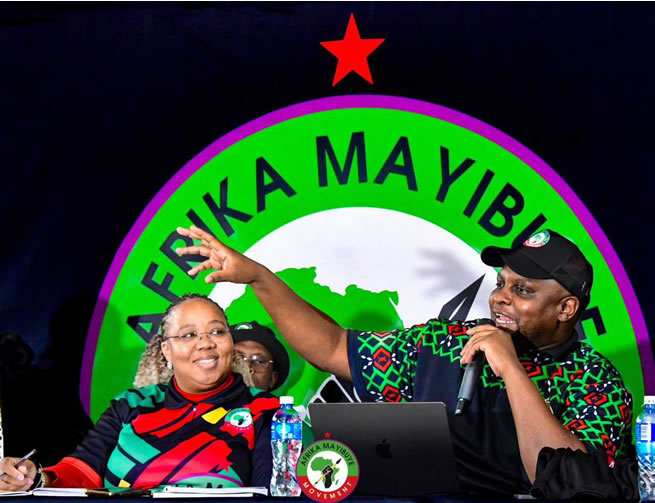Barely two months after its ambitious launch, the Afrika Mayibuye Movement (AMM) finds itself embroiled in a political storm, grappling with internal discord and accusations of misconduct. The fledgling movement, which promised to return politics to the people and champion "total freedom and emancipation," is already facing a significant test of its unity and stability.
At the centre of the turmoil is Nolubabalo Mcinga, the movement's first deputy president and a former Economic Freedom Fighters (EFF) member of the National Council of Provinces. Mcinga has been permanently removed from her leadership role, a decision the organisation describes as "a sound and sensible permanent decision taken to decisively protect and defend the integrity of the organisation against infiltration and abuse of office for personal gain".
According to a statement released by the AMM, "In terms of the constitution, the national officials have the authority to appoint and remove leaders from organisational responsibilities, and they duly exercised this right," asserting that the decision followed proper legal and constitutional process. While ousted from her leadership position, Mcinga remains a member of the movement.
However, the grounds for disciplinary action, as outlined by the national officials, paint a picture of serious allegations. The AMM leadership claims Mcinga held unauthorised meetings with uMkhonto weSizwe Party (MKP) president Jacob Zuma, during which she reportedly discussed "$500 billion [R8.6 trillion] in direct investments [that] will establish Black Dollar Billionaire," all without the party's mandate.
The movement stated that its leadership "did not approve of any of these and Mcinga never had a mandate to discuss anything on our behalf." Furthermore, she is accused of convening meetings with provincial leaders, including Mary Phadi from Mpumalanga, and "purporting to make commitments on behalf of the movement without sanction, authority or delegation".
Adding to the gravity of the situation, the AMM alleges that Mcinga circulated false or misleading information and attempted to canvass members to form or support a separate political party, even approaching the council of elders to advance personal interests. The statement explicitly rejects any claims that Mcinga had been promised a salary, VIP protection, or other benefits, emphasising that "Mayibuye is not an employment agency; it is a people-founded movement." It also noted that assistance she had received from individual officials during times of financial distress was "far higher than any amount she has ever received as a salary anywhere".
The removal of Mcinga has intensified speculation about deepening divisions within the party. Her own social media posts on X have stoked intrigue and appear to critique the leadership. She wrote: "Any political formation that disrespects traditional leadership, undermines women and is itself the source of sexual harassment cannot claim moral or spiritual legitimacy."
Despite these allegations and the swirling rumours of a breakaway women's party, Mcinga insists she remains loyal to the movement she helped establish. "People outside the movement have come to me for advice on setting up a new party, but I have no plans to do so myself right now," she said, stressing her continued commitment to the AMM.
She confirmed, however, that she had been removed from several internal WhatsApp groups without explanation, a move she described as "unfortunate and premature". Responding to a letter containing the allegations against her, she stated: "I am not forming a new party with anyone from Mayibuye but have been approached by individuals seeking advice on establishing one. If and when anything formal arises, I will make an official announcement through a press conference. For now, I will await the outcome of internal processes."
The AMM, which sought to distinguish itself from established parties like the EFF and MKP, is already grappling with mistrust and internal power struggles. Sandile Manana, former deputy president of the Mayibuye Youth League, recently resigned and rejoined the MKP, accusing the AMM leadership of neglecting expansion efforts and alienating supporters with heavy-handed tactics.
Undeterred by her removal from leadership, Mcinga continues to use her platform on X to issue moral and ethical critiques, often in coded, poetic language. "To violate women and dishonour traditional authority is to invite a curse upon oneself," she wrote.
On Sunday, she shared a photograph of herself with AMM leadership, captioned: "Real spice is knowing when to stay silent. True danger sits closest to power, smiling beside it. The real spies and plotters are never far. Power drunk with ego blinds wisdom, but my energy remains for the cause, not betrayal."
As the AMM barely finds its footing, this internal discord threatens to overshadow its mission before it can even establish a national presence. Yet, the party remains resolute, stating: "We reaffirm our constitutional obligations and revolutionary commitment to collective leadership and remain resolute in protecting the organisation's integrity and unity while upholding discipline without fear or favour, and ensuring that accountability within the movement is principled rather than personal."
The coming weeks will be crucial in determining whether the AMM can weather this storm and maintain its relevance in the South African political landscape. The allegations against Mcinga, her response, and the internal divisions within the party all contribute to a complex and uncertain future for the fledgling movement.

Follow Us on Twitter











